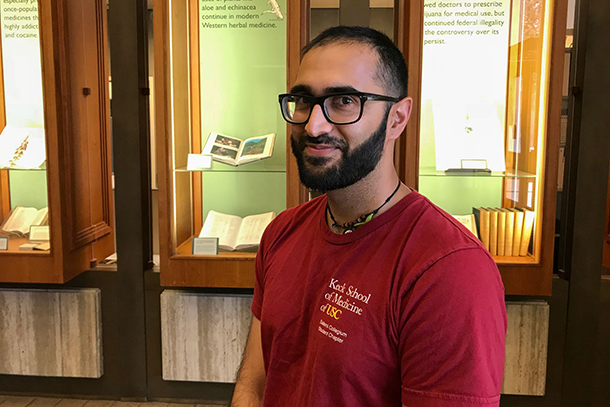Policy decisions on health care challenges are made at local, state and even international levels.
By opting for a Master of Public Health (MPH) degree, medical student Anish Parekh aims to develop the skills and experience to work with policymakers on one of those pressing challenges — global warming.
Parekh, a third-year student in the Keck School of Medicine of USC’s dual-degree MD/MPH program, said his goal is to affect public policies to help underrepresented communities deal with the inevitable health effects of climate change.
“I hope to work at a national, or even international scale, because these issues will be global in scope,” he said. “But doctors always work at a local level, too — with patients, local authorities, city municipalities, various departments.”
Parekh said the MD component of his education will be important to making a difference, just as much as dealing with statistics and regulatory structures.
“I read a study that said that the people who are most trusted for information about climate change are doctors — primary care physicians,” he said, echoing a frequent theme at USC’s Health Sciences Campus: that physicians with direct experience with patients have a special credibility not only with patients, but with elected officials.
Global climate change and Affordable Care Act fallout
In early June, Parekh traveled to Sacramento with a group of medical students led by Michael Cousineau from USC’s Department of Preventive Medicine.
The group met with Assemblyman Jim Wood, co-chair of the Select Committee on Health Care Delivery Systems and Universal Coverage in California. They interacted with Wood during a 90-minute discussion of how California will deal with the fallout from changes to the Affordable Care Act, and the failure of attempts to establish a statewide single-payer system for covering Californians’ medical expenses.
Parekh — whose father, Dilipkumar Parekh, is a professor of clinical surgery at the Keck School of Medicine — said that USC offered a vibe that he felt had a special appeal.
“USC is one of the few institutions where you truly feel cosmopolitan, in the sense that there are so many opportunities open to you that you may not even realize what they all are,” said Parekh, who completed his undergraduate degree in biology at the university.
Studying satellite data at JPL
For Parekh, that meant pursuing an internship at the Jet Propulsion Laboratory in Pasadena.
“I wouldn’t have known JPL had an opportunity for a med student,” he said. “But one of my instructors knew the lead scientist on the project.”
At JPL, Parekh studied satellite data to determine if changing factors such as humidity could be used to forecast future outbreaks of influenza around the world. Eventually, researchers believe health care organizations may be able to get three to four weeks’ advance notice before they need to mobilize resources to combat an outbreak.
“If I hadn’t been at USC,” Parekh said, “with those kinds of connections among people in widely diverse fields of study, I wouldn’t have had that chance to get important experience in global health work.”
Despite the long, intense curriculum of a dual-degree program, one of which is the seemingly sufficient challenge of a traditional MD degree, Parekh said such experiences outside the classroom were a critical part of his education.
“There are things that happen to you in medical school that you don’t expect,” he said, “but they’re just mind-blowing.”
— Paul Boutin


